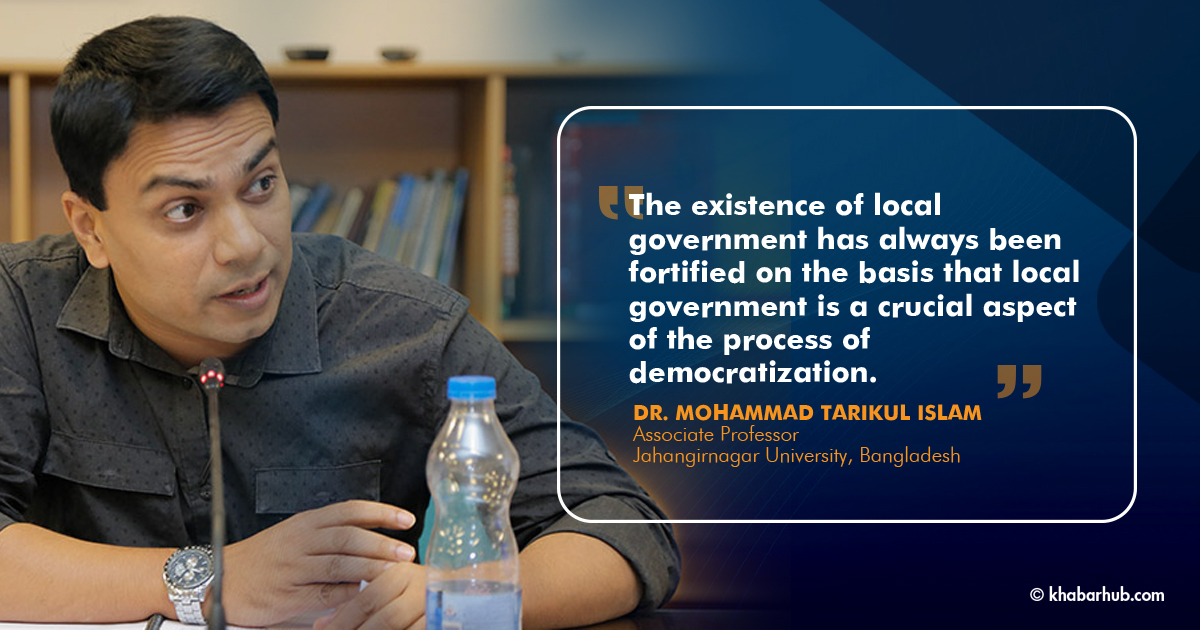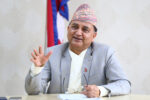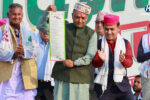The progressive interpretation of democratic values requires local government elected representatives and officials of the local administration with integrity, which in turn weights impartiality, sensibleness and trustworthiness.
The community perceiving the particular activity should have the right and freedom to express their views on the matter associated with the common welfare or public interest.
With democratic values in mind, it is imperative to focus on the significance of local government to engage people throughout the entire process of community welfare.
The existence of local government has always been fortified on the basis that the local government is a crucial aspect of the process of democratization.
Undeniably, the local government can serve as the training ground for mass political education, political leadership, and social accountability.
The unequal economic structure trends to influence the local bodies by pro-partied class. They often tend to suit their class interest and purposes. As a result, LG cannot render proper services to the people at the local level.
Moreover, the democratic facet of local government conventionally unfolds in political parties, local elections, local leadership and participatory mechanisms.
The functional side of local government explains in policy-making and service delivery aspects taking place in inter-governmental settings. In the modern era of democracy, local governments have increasingly encountered public policy challenges spanning across multiple authorities.
Local representative democracy has opened up an opportunity for the local people to be mindful in selecting their local leaders as well as engaging in the development process at the grassroots level in South Asia.
Such party-based local government election enables elected representatives to get the maximum benefit from the political government.
The central political party in power implement their agenda at the local level with maximum backing of local government elected representatives.
For instance, past observations of local government in Bangladesh show that the successive governments had to establish some kind of local government structure in order to mobilize the support of the rural communities in their favor by providing welfare measures.
Hence, local government could not successfully provide opportunities to the people, irrespective of party affiliation, to participate in the development activities.
Apparently, the colonial pattern of administration in the local government has been categorized as elitist and alienated nature.
The major challenge for the political party has to organize themselves with their dedicated supporters who will steer the wheel of the party at the grassroots level.
Administrative officials working at the local government are bureaucratic and alienated from the people, and therefore, people cannot properly take part in different activities of local government at the grassroots level in South Asia.
The weakness of its socio-economic base remains a key obstacle in the way of democratic education through local government.
The unequal economic structure trends to influence the local bodies by pro-partied class. They often tend to suit their class interest and purposes. As a result, LG cannot render proper services to the people at the local level.
Besides, the presence of the local elite dissuades the general public from participating in the local government, which results in a less effective local government.
In rural South Asia, this remains a major impediment to popular participation in local level elections. Such attitude results put the candidates who have lost and their supporters in conflict with the winners.
Consequently, they do not cooperate with the winners, resulting in a challenging situation for the functioning of the elected council. Politico-administrative contradictions often disrupt the very functioning of local government.
Grassroots political movement refers to the social movements that originate in the grassroots of society and often contain the potential to shape the political culture.
This movement gives voice to the interests of the poor and margined in different forms. It attempts to mobilize individuals living in the remote part of the country to take some action to influence an outcome, often of a political nature.
In practice, grassroots political movement enables mobilize individuals to articulate their demands for change as well as influence the policymaker or relevant authorities at the local level to take a particular action for the overall development in the society.
Most of the developing nations are struggling to uproot the colonial legacy of the development paradigm by bringing about the elusive phenomenon of people’s participation in development initiatives which was ignored and remained only in papers as a striking slogan over the decades.
It is deceptive that participation is the key to the inclusion of community people in development efforts and the human element in development efforts persuades managing change in an effective manner.
The major challenge for the political party will now be to organize themselves with their dedicated supporters who will steer the wheel of the party at the grassroots level.
To overcome the development paradox centering around the power struggle between the MP and the local government representatives, a culture of accountability is a must and has to be created by the political party or coalition in power.
As of now, almost all parties are centrally governed, and some are pocket-based political parties with media coverage only, with no units and supporters at the grassroots level.
The major challenge for the political party has to organize themselves with their dedicated supporters who will steer the wheel of the party at the grassroots level.
Likewise, the conventional and classical philosophy of local politics revolves around social equity, social justice and social harmony to retain high ethical and moral standards in every course of action.
Social equity may also demand that local government development should take place in such a manner that the rule of law will prevail.
The representative role of a Member of Parliament (MP) could be categorized into three dimensions: a) political representation, b) representation of social diversity, and c) constituency representation.
Constituency representation places a particular focus on the parliamentarians’ involvement in local development work through local government bodies.
Local government bodies in every administrative unit of the republic are the major actors in the field of local development work.
MP should monitor different activities of the local government bodies from a distance, just to ensure that they follow the parliament-adopted policies. But the provision of constituency services by the MPs, through control and partisan distribution of public resources, aggravates the probability of corruption and conflict of interest.
The success of the local government development planning and scheme largely depends on how well the local leadership, MP and the general people interact in an environment of cooperation and partnership.
To overcome the development paradox centering around the power struggle between the MP and the local government representatives, a culture of accountability is a must and has to be created by the political party or coalition in power.
While decentralization is a significant catalyst for sustainable development in rural South Asia, the prevailing servant-master relationships between MPs and bureaucrats and locally elected representatives need to be changed, and mutual understanding in the decision-making process should be fostered.
To make development truly meaningful, involving people directly in the formulation and implementation of decisions is the demand of the hour. This necessitates the decentralization of democracy to the lowest level.
MPs must bear in mind that they are elected by the people of their constituencies and could be unseated in the next election if they fail to look after their interests.
Therefore, a strong political will is required for the effectiveness of the local government as a democratic body in a true sense.
While the non-state actors (NGOs, UN agencies and Donor community) are still likely to be most concerned with the essentials of improving human development, becoming involved in human security initiatives helps to strengthen them as organizations and to reinforce and extend the contribution that they are able to make to the people with whom they already work.
To make development truly meaningful, involving people directly in the formulation and implementation of decisions is the demand of the hour. This necessitates the decentralization of democracy to the lowest level.
Let political parties and relevant stakeholders including community people take lessons to overcome them for the greater interest of the nation.
There is a need for a paradigm shift in government, from imposing development into facilitating rural development, from teaching local people to learning together with them. Mainstreaming human security to the existing mainstream rural development approaches is a must.
(This Opinion is based on an interview with Dr. Mohammad Tarikul Islam, an Associate Professor of the Department of Government and Politics at Jahangirnagar University in Bangladesh. He is the Visiting Scholar of Oxford and Cambridge. Before joining the university, Dr. Islam was serving the United Nations for seven years. As a popular development columnist in South Asia, Professor Islam writes for the LSE South Asia Blog, Oxford Political Review, Cambridge Global Human Movement Blog, Oxford Department of International Development Blog, the Khabarhub, the Daily Star, the Daily Independent, the Financial Express, The Business Time, the Daily Jugantor and the South Asia Monitor regularly)








Comment